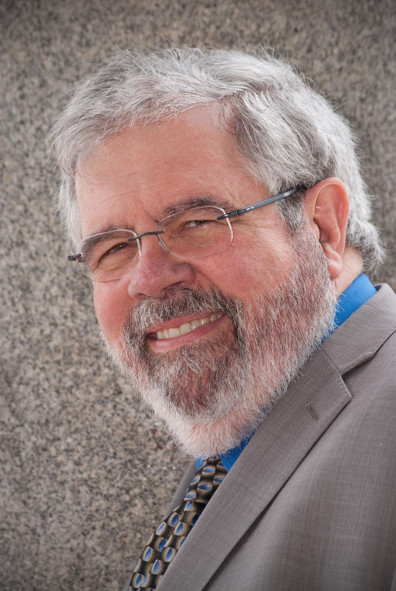Hoops Forum Features Pulitzer Prize Winner
 David Cay Johnston, author and investigative journalist who won the 2001 Pulitzer Prize for reporting on U.S. tax policy, was the keynote speaker at the spring 2015 Hoops Forum on Taxation.
David Cay Johnston, author and investigative journalist who won the 2001 Pulitzer Prize for reporting on U.S. tax policy, was the keynote speaker at the spring 2015 Hoops Forum on Taxation.
The forum engages students and the campus community around issues of taxation, government regulations, and the importance of voting.
“I want to talk to you about things that may be a little jarring,” Johnston said to more than 300 students and community members who attended his presentation, “Taxing the Many to Give to the Few: How Government Creates Inequality” in Spokane and Pullman.
“If aliens came to Earth and had to write a report, it would say humans love taxes more than anything,” he said. “Yet, we have allowed our political leaders to turn ‘tax’ into the most vile four-letter word in American politics. In reality, Americans live in an incredibly unequal society.”
 Drawing from passages in his latest book, Divided: The Perils of Our Growing Inequality, Johnston spoke about the economic effects of growing income disparity in the United States. Quoting Nobel Memorial Prize in Economic Sciences winner Joseph Stiglitz, Johnston said, “Inequality didn’t just happen; it was created.”
Drawing from passages in his latest book, Divided: The Perils of Our Growing Inequality, Johnston spoke about the economic effects of growing income disparity in the United States. Quoting Nobel Memorial Prize in Economic Sciences winner Joseph Stiglitz, Johnston said, “Inequality didn’t just happen; it was created.”
Drivers of economic inequality
Johnston reported that the tax system has been a primary driver of growing U.S. inequality, due to the fact that the system is not designed to fairly and effectively distribute the tax burden. Wage-earnings are efficiently taxed, while investments and business accounts are more difficult to examine and collect upon, allowing the wealthiest Americans to under-report income and overstate expenses.
Johnston called this practice “modern alchemy”—accounting that converts tax expense into profit—and said our country’s founders warned inequality would destroy America.
But more money is not the only advantage that affluent Americans enjoy.
Johnston identified health and education as other sources of income inequality. As one example, he said the $14.7 trillion put at risk by taxpayers in the Wall Street bailout equaled the entire output of the American economy in 2009.
“That much money would pay for the Special Supplemental Nutrition Program for Women, Infant and Children (WIC) for 2,261 years, and 433 years’ worth of Pell grants for college students,” he said. “Do we love poor children and want to make sure they get a good diet in the womb so they don’t grow up to be morons, or do we love Wall Street bankers?”
He also presented tax return data showing that $6.6 trillion of national income was not realized between 2000 and 2012. He said this equated to $48,010 per household—enough money to pay all the taxes on that income and pay off every auto loan, credit card debt, and student loan in America, leaving $17,800 cash per household. He said the Athenian society laid out a solution to this 2,500 years ago with a progressive taxation system: the greater the fortune one built, the greater the duty to pay taxes so that Athens would endure.
People must act like citizens
He said the reason the United States is in terrible economic straits is because too many people aren’t acting like citizens and either vote ideologically or not at all.
“You are going to choose what you do in your lives and decide if you want to be citizens,” he said. “You should make the choices you want to make; that is what freedom’s about. But understand choices have consequences. Someday high school students will open a history book that begins with the words ‘The United States of America was…’”
To watch the video of Johnston’s address, visit go.wsu.edu/dcjohnston. His visit was co-sponsored by the WSU Thomas S. Foley Institute for Public Policy and Public Service.
The Howard D. and B. Phyllis Hoops Institute of Taxation Research and Policy is directed by Professor Jeff Gramlich and provides lectures, seminars, and speaking engagements on the topics of taxation research and philosophy. It bridges disciplines, engaging industry leaders, academics, and students to examine the economic, political, and behavioral impacts of tax policy.